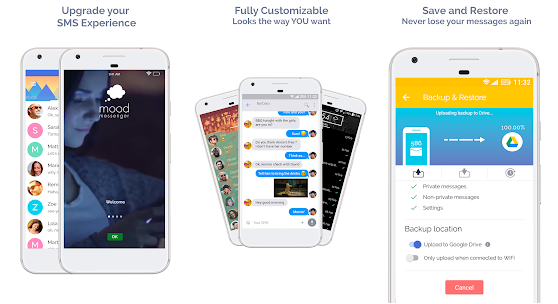5 Android messaging apps to make chatting safer, easier and more fun

In today’s world, text messaging has become the most popular form of communication among smartphone users. Why? It’s simple, it’s fast and it saves you from the inconveniences that can come from actual phone conversations.
Android comes with its own built-in text messenger, which is a solid choice for anyone to use. It even has an app that can filter out spam text messages, however, there are some features and capabilities that only can be found in third-party texting apps.
While there are plenty of great Android texting apps out there, we wanted to present you with a few of our favorites. Here are 5 of the best texting apps for Android right now:
1. QKSMS

If you’re looking to break away from the generic Android messenger, try this good-looking app. With a clear, smart and clutter-free layout, QKSMS makes texting stylish and simple. It also comes with a wide variety of customizable options like colors, background themes and night mode, which can turn a black-on-white into white/gray-on-black display.
Additionally, the app comes with a Quick Reply feature that allows you to respond to a text without having to access the app itself. So, no matter what you’re doing on your phone, you can respond to a text by using the apps’ pop-up message bar.
You can download QKSMS from the Google Play store.
2. Mood Messenger

Mood is another clean-looking app that features a great combination of design and capability. The name comes from what the developers call “Smart Emojis,” which are predicted from your texts, depending on the words used. You’ll also find chat bubbles, individual ringtones and custom fonts against the backdrop of over 100 themes.
Aside from the look, Mood comes with a few additional features which may seem subtle but can be very helpful in the long run. One is the typing indicator, which lets you know when the person you’re texting is typing their response. The app also comes with private messaging and full encryption capability — you can even hide an entire chat behind a key password if you like.
The Google Play store has Mood available for download now.
3. WhatsApp

Best known for its simple interface and accessibility, WhatsApp has established itself as one of the most popular messaging apps among users in 2019. Once installed, the app creates a user account based on your phone number, which means no difficult registrations, no nicknames, no authorizations and no hassles when searching for and adding friends.
Additionally, the app uses your phone’s internet connection to let you send messages, so you don’t need to pay for every message you send. A default end-to-end encryption makes your messages more secure as well.
4. Viber

With over a billion users around the world, Viber focuses on a simple user interface and automatically adds your contacts when you install it.
Similar to WhatsApp, Viber uses your phone number to identify you upon initial setup. No need for a username, password or screen name to register, and there are unlimited free texts, voice and video calls to other Viber users across the network.
Viber also offers charged international calls to unregistered landlines and mobile numbers for an incredibly low rate. This is great for businesses that may have to message clients or teams that may be overseas.
Viber can be found here, in the Google Play store.
5. Textra SMS

This one is an oldie but goodie, as it still remains among the top texting apps on Android. Textra is quick, smooth and dispenses with any unnecessary clutter.
Its big push comes from its customization options. You can tailor and configure the interface settings to fit your specific taste and style. With 200 theme combos, GIFs and 21 different text sizes, Textra remains a great option for handling your text messages.
You can schedule messages to be sent out at specific times and even set up delayed sending, which prevents messages from being sent by accident. You also have the ability to take pictures and send them via MMS to your entire group of friends.
Tags: Android, encryption, Google, internet
